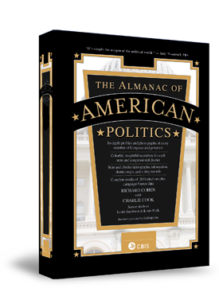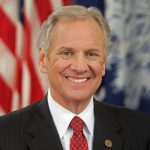
By Louis Jacobson, Almanac of American Politics | Henry McMaster, a longtime Republican officeholder in South Carolina, was elevated to the governorship in 2017 after Nikki Haley was confirmed as President Donald Trump’s ambassador to the United Nations. He won a full term in 2018 and is expected to run again in 2022, when he’ll be 75 on Election Day.

McMaster, a native of Columbia, received his bachelor’s degree from the University of South Carolina in 1969 and his law degree from the same university four years later. He served a year as a legislative assistant to U.S. Sen. Strom Thurmond, after which he built a private practice in South Carolina. In 1981, President Ronald Reagan appointed McMaster to serve as U.S. attorney. During his four years in the post, his office helped convict more than 100 people for importing nearly $1 billion in illegal drugs. In 1986, McMaster ran against longtime Democratic U.S. Sen. Ernest Hollings, but lost. Four years later, he ran for lieutenant governor and lost again. In 1991, then-Gov. Carroll Campbell appointed McMaster to the state Commission on Higher Education, and for most of the 1990s he headed the state Republican Party.
McMaster finally won elected statewide office—attorney general—2002. After securing the GOP nomination in a contested primary, McMaster defeated Democrat Steve Benjamin, 56 percent to 44 percent, and easily won a second term four years later. As attorney general, McMaster took a leading role in opposing the Affordable Care Act. He threw his hat into the ring for the open-seat gubernatorial race in 2010. The large Republican primary field also included Lt. Gov. André Bauer, Rep. Gresham Barrett, state Sen. Larry Grooms, and state Rep. Nikki Haley; Haley won the primary and then the general election. In 2014, McMaster ran for lieutenant governor, winning the Republican primary and defeating Democrat Bakari Sellers in the general election, 59 percent to 41 percent.
McMaster as a new governor
After being elevated to governor, McMaster’s early tenure featured plenty of legislative drama. McMaster vetoed a bill that would have raised the state’s gasoline tax for the first time since 1987, but the measure—which received support from the party’s business wing—became law after the legislature voted by a wide margin to override. He also drew fierce legislative opposition to a spending-bill veto that would have allotted $20.5 million to replace aging and fire-prone school buses; McMaster said it was unwise to earmark lottery funds for that purpose rather than for scholarships. The legislature overwhelmingly overrode that veto, too.
 Both vetoes were widely believed to be fodder for the GOP’s anti-tax, small-government base as McMaster headed into what promised to be a tough primary season. McMaster made other moves that pleased the GOP base, however. He asked the federal government to stop the resettlement in South Carolina of refugees from the countries targeted by Trump’s travel ban; he signed an executive order protecting a foster care agency that limited its services to Christian families; and he vetoed almost $16 million in women’s health services to end state funding for Planned Parenthood. McMaster also worked, unsuccessfully, to block a proposed tariff that could have hit Samsung washing machines being built in a newly opened plant in the state, and he sought to derail a Trump administration plan to allow drilling off the Atlantic coast. McMaster, joined by the state’s congressional delegation, fought the Trump administration’s plan to shut down a partially built facility at the Savannah River Site that would reprocess plutonium from weapons into nuclear fuel. He also urged a sale of Santee Cooper, a state-owned electric utility saddled with $4 billion in nuclear-related debts, though some in the legislature pushed back on the idea. (In 2020, the utility would settle with ratepayers for $520 million over the nuclear plant debacle.)
Both vetoes were widely believed to be fodder for the GOP’s anti-tax, small-government base as McMaster headed into what promised to be a tough primary season. McMaster made other moves that pleased the GOP base, however. He asked the federal government to stop the resettlement in South Carolina of refugees from the countries targeted by Trump’s travel ban; he signed an executive order protecting a foster care agency that limited its services to Christian families; and he vetoed almost $16 million in women’s health services to end state funding for Planned Parenthood. McMaster also worked, unsuccessfully, to block a proposed tariff that could have hit Samsung washing machines being built in a newly opened plant in the state, and he sought to derail a Trump administration plan to allow drilling off the Atlantic coast. McMaster, joined by the state’s congressional delegation, fought the Trump administration’s plan to shut down a partially built facility at the Savannah River Site that would reprocess plutonium from weapons into nuclear fuel. He also urged a sale of Santee Cooper, a state-owned electric utility saddled with $4 billion in nuclear-related debts, though some in the legislature pushed back on the idea. (In 2020, the utility would settle with ratepayers for $520 million over the nuclear plant debacle.)
The 2018 election
In the 2018 primary, McMaster faced former state agency head Catherine Templeton, Lt. Gov. Kevin Bryant, former Lt. Gov. Yancey McGill, and businessman John Warren. McMaster received endorsements from South Carolina Citizens for Life and the National Rifle Association, and he touted a strong economy. But his opponents attacked him as an apostle of a tired and corrupt political establishment. Late in the campaign, Warren gained ground by leveraging his outsider profile. A 39-year-old Marine veteran from Upstate, he owned a mortgage lending firm; a relatively late entrant in the race, Warren spent $3 million from his own pocket, including a heavy run of television ads. McMaster finished first with 42 percent, followed by Warren with 28 percent, Templeton with 21 percent, Bryant with 7 percent, and McGill with 2 percent. That made McMaster the first modern South Carolina governor in either party to be forced into a primary runoff. On the eve of the runoff, Trump visited South Carolina to promote McMaster, who had been the first statewide official anywhere to back Trump before the state’s 2016 primary. Trump had the magic touch: McMaster prevailed, 54 percent to 46 percent, ceding only a few counties in Warren’s Upstate home base. Republicans “picked the candidate Trump liked over the Trump-like candidate,” The State newspaper wrote.
In the general election—running for the first time on a ticket with a lieutenant governor candidate, following a change in state law—McMaster faced state Rep. James Smith, who Democrats considered a strong candidate. Smith was an Afghanistan combat veteran and an experienced legislative hand who had easily won a three-way primary with the support of national Democratic leaders. But McMaster benefited from a fundraising edge and strong marks for handling the economy, and he won, 54 percent to 46 percent. Despite some modest gains over their 2014 performance, including areas in and around Charleston and Columbia, Democrats found that the final few percentage points needed to score a statewide victory remained elusive.
McMaster’s first full term

In 2019, McMaster shepherded a $115 million incentive plan to support a state-of-the-art facility for the NFL’s Charlotte Panthers to be constructed in Rock Hill, just across the border from the team’s North Carolina base. The facility was designed to be a hub for further economic development along I-77, which would be upgraded with a new interchange. He also approved a $159 million teacher pay raise and additional funding for school counselors. In general, legislators’ hopes of a more collaborative governorship than Haley’s or that of her predecessor, Mark Sanford, came true, though McMaster did have a rough time with several personnel matters. The Senate rejected the nominations of two figures close to McMaster: Stephen Morris to lead the Office on Aging and Charlie Condon as head of Santee Cooper. And McMaster’s efforts to name Robert Caslen, a retired three-star Army general, to the presidency of the University of South Carolina were met with student and faculty opposition, citing Caslen’s lack of experience in academia. Caslen was ultimately approved, but the university’s accreditor later concluded that McMaster had used undue influence in the hiring process. In 2021, Caslen resigned after portions of his commencement speech were found to have been given without attribution.
During the coronavirus pandemic in 2020, McMaster’s approach mirrored that of other Republican governors. He issued a stay-at-home order relatively late—he was the last of the 42 governors who did so—and then, within weeks, loosened restrictions on a wide swath of businesses and public amenities. And despite a summer spike in cases, McMaster declined to issue a statewide mask order. “We cannot live in fear of the virus and shut down every institution in sight,” he said. “It will not work, and it certainly won’t work here.” As in most other states, outcomes were generally independent of policy. South Carolina was in the middle of the pack in terms of COVID-19 death rates among the states.
In September as Trump was facing a tight reelection contest, the president backed off his plans to allow oil and gas drilling off the coast of South Carolina, as well as the coasts of Florida and Georgia, a victory for McMaster. And in early 2021, McMaster signed a “fetal heartbeat” bill that would ban all abortions if a heartbeat is detected, unless the pregnancy was caused by rape, incest, or threatened the life of the mother. The measure would also put the abortion provider at risk of a felony, with a possible prison sentence of two years.
The 2022 election
Despite having already become South Carolina’s oldest governor, McMaster is widely expected to run again in 2022. (His father, an attorney, was handling cases at 93 and died at 99.) In a development that should raise his profile and enhance his fundraising, McMaster joined the executive board of the Republican Governors Association in 2020. But he won’t have the field to himself. In a move that could portend a primary challenge, Warren formed a political action committee, and Templeton could mount another primary bid. On the Democratic side, the frontrunner is Steve Benjamin, who after his 2002 loss to McMaster for attorney general became the first African-American mayor of Columbia and served as president of the U.S. Conference of Mayors in 2018 and 2019. [Editor’s note: To date, former Congressman Joe Cunningham of Charleston, and state Sen. Mia McLeod and activist Gary Votour, both of Columbia, have announced as Democratic candidates for governor.]
Louis Jacobson is a senior author of the Almanac of American Politics. This column, republished with permission exclusively in South Carolina, comes from the almanac’s new 50th Commemorative Edition for 2022. It can be purchased online or by calling 1-888-265-0600. BONUS: Use the code “15AAP2022” for a 15 percent discount during check-out.
Next week: The Almanac’s look at South Carolina politics.
- Have a comment? Send to: feedback@statehousereport.com.



Pingback: Statehouse Report – 2022 ELECTION: Preview of gubernatorial race – Statehouse Report - updatem
Pingback: Charleston Currents – NEW for 8/30: USS Charleston, Rescue Brew, victories, more